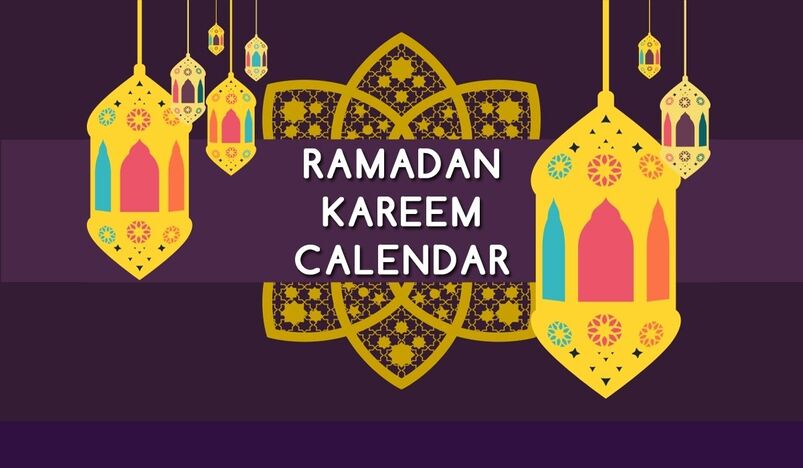
Ramadan is based on Islamic calendar and the dates differ each year
Muslims follow a lunar calendar — that is, one based on the phases of the moon — whose 12 months add up to approximately 354 days. That's 11 days shorter than the 365 days of the standard Gregorian calendar. Therefore, the Islamic lunar calendar moves backward approximately 11 days each year in relation to the regular Gregorian calendar.
So that means that the first day of the month of Ramadan, which is the ninth month of the Islamic lunar calendar, moves backward by about 11 days each year.
This has a large impact on how people experience Ramadan from year to year. When Ramadan falls in the winter, it's much easier to fast: the days are shorter, which means you don't have to fast as long, and it's colder out, so not being able to drink water all day isn't as big of a deal because you're not sweating as much.
Conversely, when Ramadan falls in the summer, fasting can be brutal. In many Muslim countries in the Middle East and Africa, summer temperatures can reach levels usually reserved for the deepest bowels of hell.
And in some Northern European countries such as Iceland, Norway, and Sweden (where, yes, there are Muslims), fasting can last an average of 20 hours or more in the summer. And in a few places above the Arctic Circle, the sun never actually sets in the summer. In these cases, Muslim religious authorities have decreed that Muslims can either fast along with the closest Muslim country or fast along with Mecca, Saudi Arabia.
Okay, but why is there always confusion every year about exactly what day Ramadan starts on?
There's a reason "Ramadan start date" is one of the most-searched phrases every single year. That's because Muslims around the world do not know when exactly Ramadan is actually supposed to start. If you Google it, you'll see there's a little disclaimer under Google's answer that says "Dates may vary":
:no_upscale()/cdn.vox-cdn.com/uploads/chorus_asset/file/22424760/Screen_Shot_2021_04_06_at_2.23.44_PM.png)
That also has to do with the moon — as well as disagreements about science, history, and tradition, plus a bit of geopolitical rivalry.
The beginning of each new month in the Islamic calendar starts on the new moon. Which means the month of Ramadan starts on the new moon. Simple enough, right?
Wrong.
If it's been a while since your high school astronomy class, here's a reminder of what the phases of the moon look like:
:no_upscale()/cdn.vox-cdn.com/uploads/chorus_asset/file/22424786/GettyImages_1291272902.jpg)
Back in Mohammed's day, in sixth-century Arabia, astronomical calculations weren't as precise as they are today, so people went by what they could see with the naked eye.
Since the new moon isn't actually super visible in the night sky (as you can see above), Muslims traditionally waited to start fasting until the small sliver of crescent moon became visible. There's even a saying attributed to the Prophet Mohammed about waiting to start the fast until you see the crescent. (Some people think this is why the star and crescent is the symbol of Islam, but the crescent was used as a symbol long before Islam.)
This method was a bit messy, though, since things like clouds or just the difficulty of spotting the moon in some locations often led to different groups starting their fast on separate days, even within the same country. Each community, village, or even mosque within the village might send its own guy out to look for the crescent, with rival groups arguing over whether the other guy really saw it.
Today, however, we have precise scientific calculations that tell us exactly when the new moon begins, and we don't need to wait until someone spots a tiny crescent in the sky. (In fact, according to the Oxford Dictionary of Islam, "The need to determine the precise appearance of the hilal [crescent moon] was one of the inducements for Muslim scholars to study astronomy.")
So, problem solved! Except that some Muslim scholars believe we should still wait until the slight crescent moon is visible in the night sky because that's what Mohammed said to do and that's the way we've always done it.
Others argue that Islam has a strong tradition of reason, knowledge, and science, and that if Mohammed were around today, he'd choose the more precise scientific calculations over sending the guy at the mosque with the best eyesight outside to squint at the night sky.
To make things even more fun, some argue that the whole world should just follow the official moon-sighting decrees of Saudi Arabia, the birthplace of Islam and the location of its holiest sites.
But not everyone thinks that's such a swell idea — especially rival countries like Pakistan and Iran, which balk at the idea of treating Saudi Arabia as the ultimate authority on anything having to do with Islam.
All this means that each year, Muslims around the world get to experience the delightful lunacy of "moon-sighting fighting." It's such a familiar feature of Ramadan that there are memes about it.
Source: Vox
.jpg)
Qatar Secures Place Among the World's Top 10 Wealthiest Nations
.jpg)
Hamad International Airport Witnesses Record Increase in Passenger Traffic

Saudi Arabia: Any visa holder can now perform Umrah

What are Qatar's Labour Laws on Annual Leave?
Leave a comment